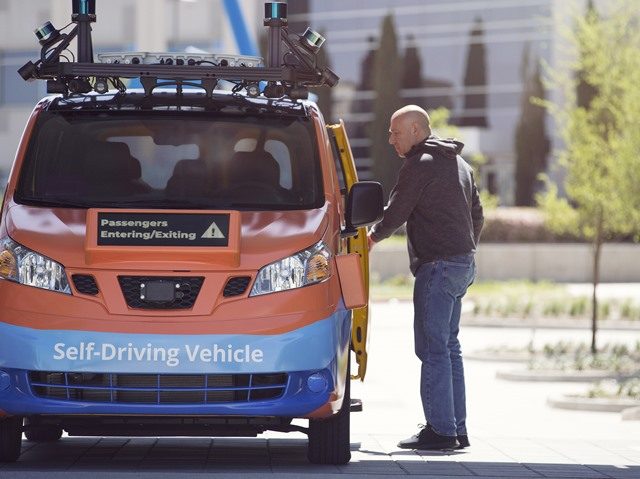Self-driving shuttles powered by Artificial Intelligence (A.I.) are coming to the streets of one booming Texas city this summer.
On Monday, California-based self-driving car company Drive.ai announced it will launch a six month pilot program in a bustling commercial section of the City of Frisco, marking the first time that an A.I. shuttle service will be offered on Texas public roads. The autonomous autos will debut in July and an expansion plan will follow, according to a company press release.
Drive.ai intends to shuttle more than 10,000 people in their bright orange-colored branded vehicles. They said the shuttles will also sport four external screens that communicate the car’s intended actions to pedestrians and drivers on the roads.
“Self-driving cars are here and can improve the way we live right now,” said Sameep Tandon, co-founder and CEO of Drive.ai., in a prepared statement. He called the company’s technology “safe, smart, and adaptive.” He said that working with the City of Frisco and the Frisco Transportation Management Association (TMA) on “this pilot program will take people to the places they want to go and transform the way they experience transportation.”
Drive.ai stated they chose Frisco because it rates as one of the fastest growing cities in the nation. In 2017, the U.S. Census Bureau ranked this sprawling suburb north of Dallas that spans across Collin and Denton counties as the second fastest growing U.S. city, bested only by the Houston suburb of Conroe.
The pilot shuttles will run along fixed pick-up and drop-off locations in “a geo-fenced area” comprised of retail, entertainment, and office space in Frisco’s North Platinum Corridor from HALL Park, a 162-acre development with more than 2.5 million square feet of Class-A office space, to The Star, a 91-acre, $1.5 billion campus which houses the Dallas Cowboys’ world headquarters, corporate offices, restaurants, a theater, retail, and an Omni Hotel. The planned expansion will fold in Frisco Station, a 242-acre mixed-use real estate including office space, luxury urban apartments, dining, shopping, and other amenities under construction adjacent to The Star.
Drive.ai limited their services to this area “so that all vehicle routes can be carefully mapped and predictably managed” locally. Officials said they thought “carefully” about how to introduce a safe experience for riders, pedestrians, and other drivers in this highly trafficked area. On Medium.com, they described the A.I.-powered shuttles as “the first of its kind” in Texas to “solve the ‘last mile’ transit problem,” meaning travel between areas that are “too far to walk but too close to drive (and often too crowded to find parking).”
According to the company, their system uses a “deep-learning-first approach to develop an integrated software and hardware solution” where self-driving capabilities adapt to various vehicles and environments. People will be able to access complimentary, on-demand shuttle service through a ride-hailing smartphone app.
A startup, Drive.ai was founded in 2015 by graduate students from Stanford University’s Artificial Intelligence Lab. They raised more than $60 million and employ more than 100 between offices in Mountain View, California, and Frisco. On this project, they partnered with the Frisco TMA, comprised of the City of Frisco, the Denton County Transportation Authority, Frisco Station, The Star, and the HALL Group.
This partnership is part of an industry effort to promote A.I. technology to a broader audience as a flood of contenders including General Motors’ Cruise hit the market, according to the Dallas Business Journal. Waymo, owned by Alphabet Inc., the parent company of Google, recently introduced a self-driving minivan commuter program in the Phoenix, Arizona, metropolitan area.
Last year, the City of Arlington launched “Milo,” short for “mile zero,” a free autonomous battery-powered slow-speed shuttle pilot program. However, it runs on select off-street trails in the city’s entertainment district that contains AT&T Stadium, home to the Dallas Cowboys, and Globe Life Park, the current ballpark for the Texas Rangers.
Arlington officials said they leased two of these vehicles from French company EasyMile. Milo’s driverless technology comes with collision avoidance systems that detect other vehicles, cyclists, pedestrians, and other obstacles. It follows a pre-programmed trail route. Even though Milo can reach up to a top speed of around 20 miles per hour, city officials indicated the vehicles travel an average of 10 to 12 miles per hour. Even though the shuttles brake, steer, and have special sensors to detect if an object or individual jumps out in front of the vehicle, a certified operator is always onboard. The cars hold up to 12 passengers, or 10 passengers and one wheelchair.
Follow Merrill Hope, a member of the original Breitbart Texas team, on Twitter.

COMMENTS
Please let us know if you're having issues with commenting.